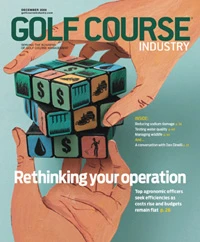Relationships are the driving force of personal success in the golf business. Having the right contacts is crucial to advancement and, in many cases, simply getting things done. Luckily, the golf business consists of a close-knit group of individuals who share information about how we can improve business and be more successful every day.
In what other industry do businesses open up their doors and offer tours to their peers to explain the secrets of their success? Our businesses are built that way. Many times, we depend on our peers for the answers to the struggles we face.
There’s an opportunity to create this type of give-and-take relationship with equipment manufacturers. During the past few years, manufacturers have turned more of their attention to technicians. Many times technicians help make a facility’s purchasing decision for turf equipment, and the manufacturers are noticing. Look at how much easier equipment is to maintain. Instead of building a machine and then adding an engine and hydraulics, manufacturers are looking at how difficult a machine will be to service. Even the marketing guys are starting to realize the importance of including the technician’s point of view when advertising equipment.
A strong manufacturer/end-user relationship benefits equipment technicians, too. They need to talk about issues they may be having with a distributor, a piece of equipment or changes they’d like to see. Equipment only gets better if technicians can tell manufacturers what they want. Manufacturers are starting to key into this with focus groups to discuss prototype equipment, parts programs and new equipment for the future. They’re seeing that close relationships with their customers are a win-win situation. The customer talks about the equipment they want, and the manufacturer builds the equipment the way the customer wants it.
Technicians can build manufacturer relationships by attending trade shows or demonstration days held by local distributors. During these events, technicians have the opportunity to discuss the product and what improvements they’d like to see. This relationship is important for technicians. The better the relationship technicians build with their distributors and manufacturers, the easier it will be to get assistance when they need it.
Technicians should consider the following points when building relationships with these companies:
- If you’re going to report problems, try to devise a solution. It’s easy to always go to someone when you have concerns, but after a few times, people start to realize the only time you want to talk to them is when you have problems. However, if you can tell them about the problem and suggest a solution, it changes the tone of the relationship.
- Call with legitimate concerns. With all the equipment manufacturers are producing throughout the world, you can imagine how many calls they receive about different topics. When you call, make sure you’ve exhausted your resources and tried to solve the problem before contacting them. It’s just like being the technician at your home course. If you’re working on something and five people call you with small issues, it’s easy to get frustrated.
- Be courteous. When you continue to have problems with equipment, it’s easy to be frustrated and wonder why a new piece of equipment has a problem already or an old piece of equipment has the same thing happening time after time. The manufacturers are just as interested in fixing and diagnosing a problem as you are. When you have an issue, it could mean others have the same. So, rather than getting upset with the individuals about your problem, help them work through the issue so you can learn why it happened and they can address the issue at the factory.
- Think through issues. When you’ve decided you’re going to make the call to the manufacturer, try to have all of your information readily available (model, serial number, hours, etc.). This will save some time because they’ll ask for these details. Also, review your issue and understand the problem, so when you’re asked about an electrical issue, you understand how it works.
Remember, relationships are the key to advancing in the golf industry. Without them, it’s a difficult uphill battle, so always treat everyone you meet with dignity and respect because you never know when you’ll need a favor, advice or maybe even a job. GCI
Stephen Tucker is the equipment manager at the Ritz-Carlton Members Golf Club in Bradenton, Fla., and the president of the International Golf Course Equipment Managers Assocation. He can be reached at 941-309-2913 or stephen.tucker@ritzcarlton.com.
Get curated news on YOUR industry.
Enter your email to receive our newsletters.
Explore the December 2008 Issue
Check out more from this issue and find your next story to read.
Latest from Golf Course Industry
- Advanced Turf Solutions’ Scott Lund expands role
- South Carolina’s Tidewater Golf Club completes renovation project
- SePRO to host webinar on plant growth regulators
- Turfco introduces riding applicator
- From the publisher’s pen: The golf guilt trip
- Bob Farren lands Carolinas GCSA highest honor
- Architect Brian Curley breaks ground on new First Tee venue
- Turfco unveils new fairway topdresser and material handler





